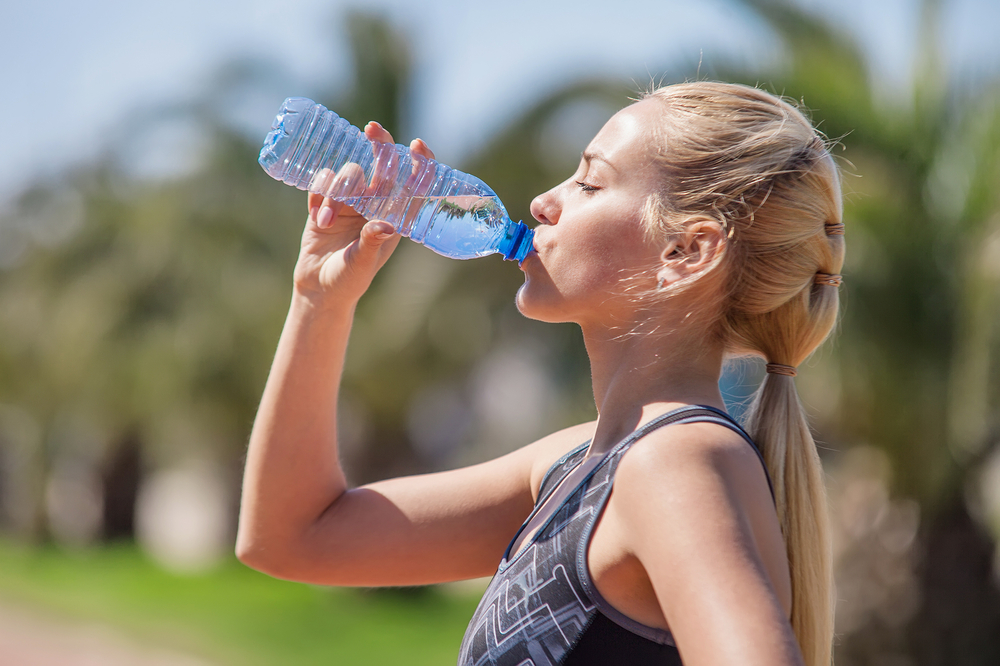You know staying hydrated is important. But do you know how to make sure you get enough water?
Are you drinking enough water? You may think you are, but you likely aren’t — especially when exercising. The standard recommendation for daily fluid intake that we tend to hear is eight cups. However, the amount varies by age group and eight is actually on the low end for practically everyone. Adult men age 19 and over should drink 131 ounces or 13 cups each day, while the recommended quota for adult women is 95 ounces or nine cups. Teenagers between 14 and 18 should aim for 64 to 88 ounces or 8 to 11 cups a day.
Your body is made up of 60 percent water, with your muscles consisting of 75 percent water. When you sweat during an intense workout, you lose fluid that you must replace. But exercise isn’t the only time you lose water. Everyday activities can also quickly sap you of water, so it’s important for everyone to stay hydrated. Let’s go over the reasons why it’s so critical and the best ways to up your fluid intake.
Why it’s important to stay hydrated
Water is important for your overall health. Your muscles and joints need water to stay flexible. It also helps remove waste from your body and maintains your body temperature. For those who exercise regularly, getting enough water is particularly essential to prevent injury. Here’s why. Whater:
Maximizes athletic performance. One study revealed that losing as little as 2 percent of bodily fluids significantly impairs athletic performance, leading to muscle fatigue and poor concentration. In hot temperatures, dehydration can lead to heat stroke.
Prevents muscle cramps. As mentioned previously, your muscles are 75 percent water. Sweating out fluids during exercise may cause your muscles to cramp and spasm. Stiff muscles are also more prone to injuries. Not something you want to happen during your workout.
Boosts weight loss. Working out to lose weight? Drink up! A study reviewed the weight loss of 50 women who drank 500 milliliters of water three times a day, thus increasing their normal daily intake. In the end, the women showed a significant reduction in body weight. The extra water was believed to slightly boost metabolism, and increased metabolism burns more calories.
Tips to help you stay hydrated
The most pronounced sign of dehydration is, of course, thirst, but it’s not the only sign. Less urination, dry mouth, and headaches are all other common symptoms. But avoiding dehydration isn’t just about drinking a lot, how and when you take in your fluids can make a difference, too. Follow these tips to make sure you’re getting enough water.
Drink before, during, and after your workout. The American Council on Exercise recommends drinking 17 to 20 ounces of water prior to working out and sipping another 7 to 10 ounces for every 10 to 20 minutes of exercise you complete. Afterwards, drink 16 to 24 ounces of fluid for every pound of body weight lost.
Make it a cold one. For working out, cold water beats room temperature water. The coldness can energize you. Also, many people prefer the taste of cold water over lukewarm.
It matters what you drink. Plain, cold water is best when it comes to hydration. But if you don’t like the taste, you can enliven your drink with lemon or lime or a splash of fruit juice. Tea and coffee can also contribute to water intake, but be sure to keep the caffeine under 400 milligrams and to get fluid from other sources as well. While sports drinks provide carbohydrates and electrolytes for energy, they can also be high in calories. So check the nutritional label. Steer clear of caffeine-heavy energy drinks.
Carry water with you in a reusable bottle. Having water on you is a great way to ensure you’re drinking regularly. And try to schedule your sips for the same times each day so you’ll always stay hydrated.
Stay healthy with NYBJS and All Sports!
At New York Bone & Joint Specialists and All Sports Physical Therapy, we’re not just focused on healing injuries, but on preventing them, as well. To make the most of your workout, visit one of experts for tips on the proper way to exercise to avoid injury, how to boost your water intake, and much more. Contact us for a consultation today.



